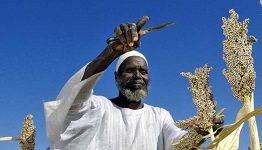The fifth African Climate Resilience Infrastructure Summit (ACRIS5) was held virtually highlighted that integration of climate resilience in the design and implementation of key areas such as, agribusiness, hydropower plants, transport corridors, urban sprawls and ecosystems like, protected areas.
The key areas are said vulnerable to climate change, is critical if Africa is to recover and building forward better to attain sustainable development and shared prosperity. Addressing the summit Jean-Paul Adam, the director of the Technology, Climate Change and Natural Resources Division at the Economic Commission for Africa (ECA) noted that increased and sustained investments in agriculture, energy, water systems, smart cities, infrastructure and resilient nature-based ecosystems are needed to propel Africa’s socio-economic growth and fast-track poverty alleviation.
“Investments in these sectors are critical for Africa trade agenda through the African Continental Free Trade Area, for regional integration and for a smart and climate neutral industrialisation agenda.”
Adam said.
“Africa presents unique challenges, but also unique opportunities for climate resilience. The challenge lies in ensuring that investments needed for growth and development gaps can happen and do so fast enough to leave no one behind. We need the resources upfront. The opportunity lies in building a resilient Africa starting from a very low base in ways that are climate resilient and inclusive.”
The summit also made a call for the harnessing of more investments to bolster the continent’s economic stability and contain widespread inequalities by integrating climate resilience into national economic plans. To do so, countries must step up investments in their hydrometeorological institutions to support the production and uptake of climate information services as critical inputs for resilience planning.
African countries must also be supported with the technical tools and human capacity to design and plan investments that can perform and deliver returns under changing climate. The Africa Climate Resilient Investment Facility (AFRI-RES) is designed for this purpose.
ACRIS has been taking place for the last six years. It is a summit arising from AFRI-RES, which is a joint initiative of the African Union Commission (AUC), Economic Commission for Africa (ECA), African Development Bank (AfDB) and the World Bank with support from the Nordic Development Fund (NDF).
In her opening speech AU Commissioner for Rural Development, Blue Economy and Sustainable Environment Josefa Sacko noted that Africa is fast tracking and modernizing its climate monitoring, forecasting and prediction capabilities which are critical to generate accurate climate information to inform appropriate resilience interventions in agriculture, food security, disaster risk reduction, energy and health services.
Giving the keynote address at the summit, Mrs. Karin Isaksson, the Managing Director of Nordic Development Fund (NDF) acknowledged the crucial role undertaken by the Africa Climate Resilient Investment Facility which is strengthening the capacity of river basin authorities, regional power pools and economic communities to plan, design, and implement infrastructure investments that are robust to climate variability and change.
“The pandemic has brought massive challenges and losses in terms of human lives and economic growth and also put a spot-light on the importance of building resilient societies’ and to build back better.” Mrs. Karin Isaksson, the Managing Director of Nordic Development Fund said. “The international community must now support the Africa continent in these endeavours. As part of COVID-19 recovery there is huge need to invest in climate resilient water supply, sanitation and integrated water resources management.”
Simeon Ehui the Regional Director for Sustainable Development for Africa African at the World Bank noted that it is imperative for Africa to enhance resilience in the critical and essential sectors. According to Ehui increasing the adaptive capacities of these sectors will cushion critical water, transport, energy and agricultural infrastructure from the adverse impacts of climate change and lessen the continent’s vulnerability.
The issue of timely and accurate climate information to inform policy and guide in knowledge-based decision making featured prominently on the opening day proceedings.
“The effects of climate change are already being felt in Africa. The continent needs to adapt to short, medium and longer-term impacts. To do so it requires a deeper understanding of climate risks and enormous financial resources.” Petteri Taalas, the Secretary-General of the World Meteorological Organisation (WMO) said.
“Significant data gaps in basic weather observations on Africa affect the quality of weather forecasts early warning systems and climate information globally. Yet this data is fundamental for effective climate actions and investments in all sectors in all African countries. It is clear that closing the data gap and the adaptation financing gap in Africa requires an innovative approach of financing basic observations.”
In his presentation at the summit, Dr Michael Rattinger of the European Investment Bank (EIB) that in 2020, the bank had provided €5bn for climate resilience, insurance and financing renewable energy in Africa and was planning to invest more in bolstering the continent’s adaptive capacity.
This summit whose theme is “Embedding and financing climate resilience towards Africa’s green recovery” brought together a high-level panel of private-sector experts and senior policymakers to discuss how to transform Africa.

